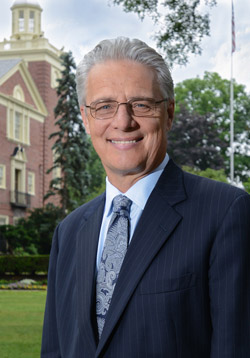
Download Image: Web
The Cornerstone of Building a Greater Lycoming
At its March meeting, the faculty approved a new major in biochemistry and a minor in entrepreneurship. These actions were the latest steps in a multi-year plan to enhance the College’s curriculum and to position the institution to enroll an even more outstanding student body. As a result, the design of the College’s general education program and the breadth of its academic programs now compare more favorably to the best of the national liberal arts and sciences colleges.
As has been the case for decades, the current general education requirements (which all students must complete) include courses in science, humanities, the arts, and social sciences. In 2014, however, the faculty added the innovative category of an “enhanced academic experience” to the graduation requirements. While a broad array of experiences satisfies this requirement, we have chosen to emphasize internships, research, and international study. In addition, we have opened a Center for Enhanced Academic Experiences to coordinate the offerings.
By requiring enhanced academic experiences, the College has embraced the idea of experiential learning and placed it at the center of the student experience. We have connected material taught in the classroom with experience beyond the physical campus. As a consequence, we expect that our graduates will become even more capable of using their Lycoming education to make a difference in their professions and act upon the world.
The department of astronomy and physics took the lead in introducing what has been a stunning array of new programs. They added a major in astrophysics, which now has more than forty majors and uses the state-of-the-art Detwiler Planetarium in the Lynn Science Center as its principal classroom. More recently, that department also added a major track in engineering physics that will serve as an excellent preparation for graduate study in engineering.
New majors in the fields of neuroscience and biochemistry have also been established. The former will allow students to engage with the rapidly expanding and revolutionary knowledge about how the brain functions. The latter focuses on the molecular level and intersects with genetics, microbiology, forensics, plant science, and medicine. The addition of both majors will enhance the preparation of students interested in healthcare. Lycoming’s science programs now include three fields — astrophysics, neuroscience, and biochemistry — that are found at nearly all of the top 100 national liberal arts colleges.
As stated in our Strategic Plan, the College has also developed programs that explore 21st-century energy issues. The first class of energy scholars will be enrolled in the fall of 2018. Students majoring in science can now pursue a minor in energy policy, while others can minor in energy science. In both cases, the minors provide knowledge about the science, politics, and economics of energy that builds on the disciplinary content acquired through the major.
Curricular innovation has not been limited to the sciences. With the addition of a Mesoamerican specialist, the program in archaeology has added a major track in Latin America and redefined its existing areas of specialization as ancient Near East and classical Mediterranean. In a related change, a major in anthropology has been added to the curriculum offered by the department of anthropology and sociology.
The humanities, meanwhile, have seen the recent addition of a major in film and video arts where students explore the use of digital technology to create, manipulate, and communicate information. An interdisciplinary opportunity to study the medieval period is also now in place.
Finally, we are very excited about the minor in entrepreneurship. It is intended to connect to and enhance all majors at the College. It recognizes that a prospective entrepreneur’s passion emerges from their major field of study, whether in the sciences, social sciences, arts, or humanities. We expect that students completing the minor will learn to identify and act upon opportunities for innovation while also becoming more competitive in the job market and better equipped to advance in a career.
The faculty at Lycoming College are engaged in a continuous process of refining the College’s curriculum so that it reflects the most recent advances in all areas of the liberal arts and sciences. I am grateful to them for their diligence and commitment to the type of curricular innovation that is the foundation of our efforts to build an even greater Lycoming.
Kent C. Trachte, Ph.D., is the 15th president of Lycoming College.